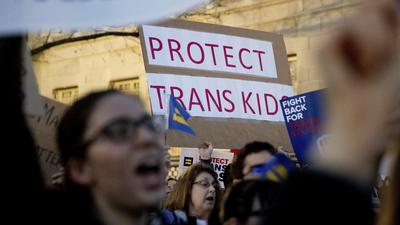Connecticut Protects Transgender Students
The day after President Donald Trump rescinded federal protections for transgender students in public schools, Governor Dannel P. Malloy strengthened Connecticut’s protection for these students.
Governor Malloy signed an executive order to protect Connecticut transgender students in public schools to use a public bathroom associated with their gender identity. “Discrimination of this kind is outrageous and has no place in our society,” Malloy said in a statement. “This shouldn’t be a partisan issue, the President’s regressive action must be rejected by all compassionate people, regardless of party affiliation.”
But several transgender students and advocates in Connecticut feel that even with state protections, they are worried and angry about Trump’s action.
Owen Schwartz, a Hebron, Connecticut teenager who is transgender, arrived home after Trump’s action and told his mother “Donald Trump hates me.” Schwartz said the president’s decision makes him feel less accepted, less respected and more fearful. “If the president doesn’t support who I am,” Owen said, “it’s kind of hard to go on with my daily life because it’s like the White House is against me. It’s a big deal.”
Robin McHaelen, Executive Director of True Colors, Inc., which provides support and services to LGBT students, said that transgender youth are among “the most vulnerable of the children that we serve” with the highest rates of suicide and the highest rates of “self-medication through substance abuse. For the federal government to send a message that they don’t matter is, in my opinion, absolutely unconscionable,” she said.
http://www.courant.com/education/hc-trump-transgender-bathrooms-20170223-story.html
Tags: Connecticut, CT, Donald Trump, Gov. Dannel P. Malloy, Hebron, LGBT, LGBT youth, LGBTQ, LGBTQ youth, Owen Schwartz, Robin McHaelen, Transgender, Transgender Students, True Colors Inc
